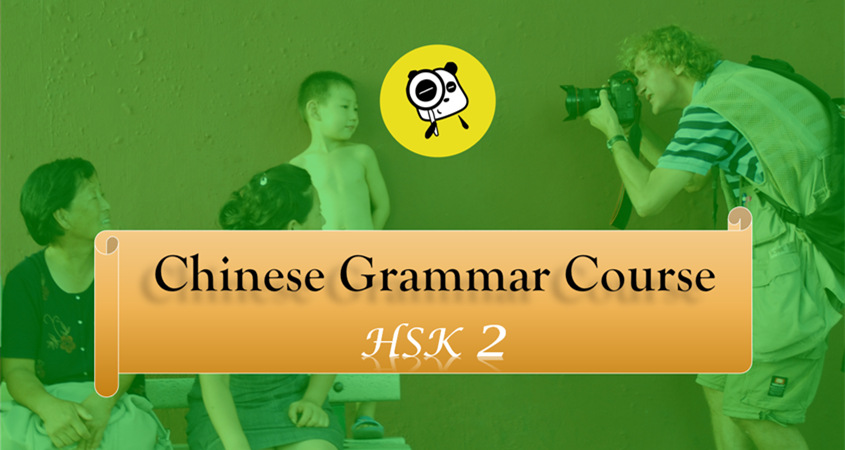This Chinese HSK 2 Grammar course is designed for all Chinese level A2 beginners. It contains a full collection of all HSK 2 grammar points. Unlike other video lessons, this course not only summarizes each grammar point, but also clears some common confusion over key grammar rules. All the video lessons are hosted by two professional Chinese teachers who provide concise and clear lessons with plenty of examples. What`s more, at the end of each course, there are corresponding grammar exercises for you to check once you`ve mastered the content. After taking this course, you will be able to confidently say that you are qualified to pass HSK 2 grammar requirements and head on to the next level.
23 video lessons
28 grammar points illustration
5 basic sentence structure summaries
4 key grammar points comparison videos
Downloadable exercises and lecture notes
Downloadable HSK 2 Vocabulary (with Audios and Examples) included
Course Curriculum
| HSK 2 Grammar Lessons | |||
| #Lesson 1 – The Three Common Uses of 多(duō) in Chinese | FREE | 00:09:00 | |
| HSK2-Exercise 1 | 00:00:00 | ||
| #Lesson 2 – The Two Common Uses of Adverb 都(dōu) in Chinese | 00:04:00 | ||
| HSK2-Exercise 2 | 00:00:00 | ||
| #Lesson 3 – The Summary of The Adverb 还(hái) in Chinese | 00:05:00 | ||
| HSK2-Exercise 3 | 00:00:00 | ||
| #Lesson 4 – The Summary of The Adverb 就(jiù) in Chinese | 00:04:00 | ||
| HSK2-Exercise 4 | 00:00:00 | ||
| #Lesson 5 – The Common Three Uses of 吧(ba) in Chinese | 00:05:00 | ||
| HSK2-Exercise 5 | 00:00:00 | ||
| #Lesson 6 – The Two Common Uses of 着(zhe) in Chinese | 00:06:00 | ||
| HSK2-Exercise 6 | 00:00:00 | ||
| #Lesson 7 – The verb reduplication in Chinese | 00:08:00 | ||
| HSK2-Exercise 7 | 00:00:00 | ||
| #Lesson 8 – The adjective reduplication in Chinese | 00:10:00 | ||
| HSK2-Exercise 8 | 00:00:00 | ||
| #Lesson 9 – The Comparison Between 从(cóng) and 离(lí) | 00:10:00 | ||
| HSK2-Exercise 9 | 00:00:00 | ||
| #Lesson 10 – The Comparison Between 一点儿(yī diǎn er) and 有点儿(yǒu diǎn er) | 00:07:00 | ||
| HSK2-Exercise 10 | 00:00:00 | ||
| #Lesson 11 – The Comparison Between 真(zhēn) and 很(hěn) | 00:06:00 | ||
| HSK2-Exercise 11 | 00:00:00 | ||
| #Lesson 12 – The Summary of 过(guò) & The Comparison Between 过(guò) and 了(le) | 00:07:00 | ||
| HSK2-Exercise 12 | 00:00:00 | ||
| #Lesson 13 – The Comparison Between 别(bié) and 不要(bùyào) | 00:06:00 | ||
| HSK2-Exercise 13 | 00:00:00 | ||
| #Lesson 14 – The Summary of the Pivotal Sentence “让(ràng)” | 00:10:00 | ||
| HSK2-Exercise 14 | 00:00:00 | ||
| #Lesson 15 – The Comparative Sentence “比(bǐ)” Sentence | FREE | 00:15:00 | |
| HSK2-Exercise 15 | 00:00:00 | ||
| #Lesson 16 – Yes-No Question & Affirmative-Negative Question in Chinese | 00:12:00 | ||
| HSK2-Exercise 16 | 00:00:00 | ||
| #Lesson 17 – The Summary of 要(yào)/快(kuài)/快要(kuàiyào)/就要(jiùyào)……了 | 00:12:00 | ||
| HSK2-Exercise 17 | 00:00:00 | ||
| #Lesson 18 – The Summary of The Progressive Tense Pattern 在(zài)/正在(zhèngzài)/正(zhèng)……呢(ne) | 00:08:00 | ||
| HSK2-Exercise 18 | 00:00:00 | ||
| #Lesson 19 – The Result Complement in Chinese: 结果补语 | 00:07:00 | ||
| HSK2-Exercise 19 | 00:00:00 | ||
| #Lesson 20 – The Potential Complement in Chinese: 可能补语 | 00:06:00 | ||
| HSK2-Exercise 20 | 00:00:00 | ||
| #Lesson 21 – The Degree Complement in Chinese: 程度补语 | 00:08:00 | ||
| HSK2-Exercise 21 | 00:00:00 | ||
| #Lesson 22 – The Quantitative Complement in Chinese: 数量补语 | 00:06:00 | ||
| HSK2-Exercise 22 | 00:00:00 | ||
| #Lesson 23 – The Simple Directional Complements in Chinese: 简单趋向补语 | 00:03:00 | ||
| HSK2-Exercise 23 | 00:00:00 | ||
| Download: HSK 2 Vocabulary (with Audios and Examples) | 00:00:00 | ||



HSK 2 Grammer
Excellent course! Learned quite a bit.
HSK 2 Grammar Review Eye Opener
This HSK 2 Grammar course is an eye opener. I have been self-studying Chinese for about 1.5 years just using the Integrated Chinese textbook and workbook with audio. I am currently preparing for the HSK 2 exam (November). During my study time, I mastered most of the vocabulary (300 characters). However, I was never able to get a clear understanding on the grammar and how to use it in sentences. This grammar course really made it easy for me to understand how to translate the Chinese sentences. Without this grammar course, I would not feel prepared to take the HSK 2 exam. Thank you DigMandarin for providing this information. Anyone studying Chinese at an introductory level will find it very useful.